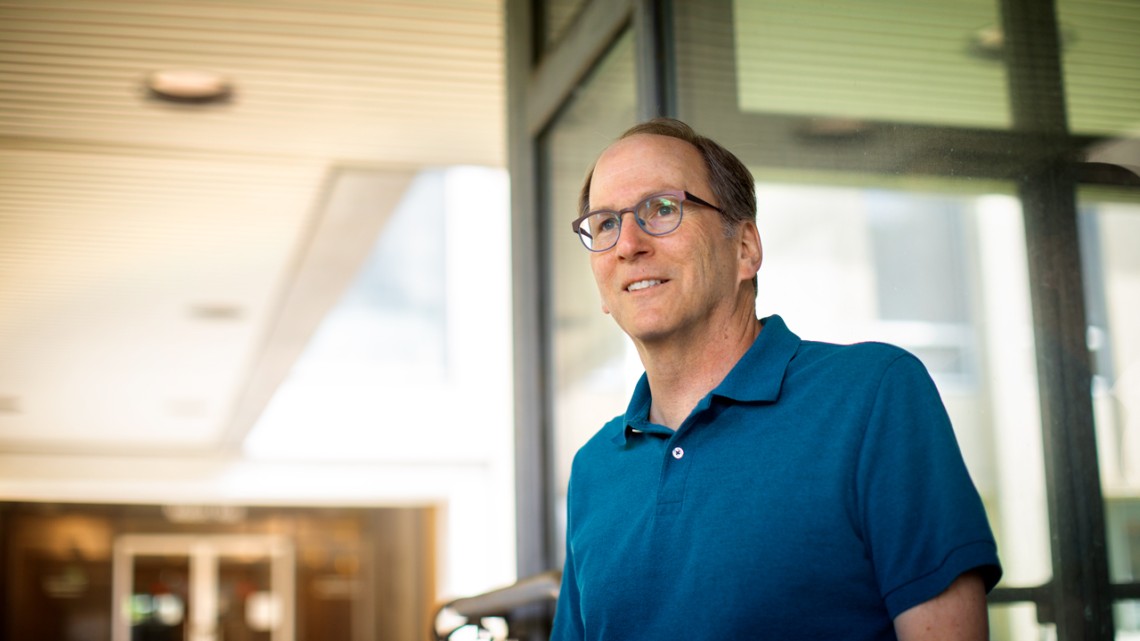
Steven Strogatz has been appointed as the inaugural holder of the Susan and Barton Winokur Distinguished Professorship for the Public Understanding of Science and Mathematics.
$5M gift establishes A&S outreach professorship
By Linda B. Glaser
Bolstering its commitment to broader engagement, the College of Arts and Sciences has established the Susan and Barton Winokur Distinguished Professorship for the Public Understanding of Science and Mathematics.
A mathematician, award-winning teacher and well-known science communicator Steven Strogatz has been appointed as the inaugural holder of the chair. The professorship, believed to be the first of its kind in the United States, is supported by a $5 million endowment and will offer dedicated time and support to enable the holder to focus on public outreach.
“Understanding and broadening public support for math and science have become ever more essential in this 21st century, and yet too many people feel intimidated and distant from both,” said Barton Winokur ’61, who with Susan Winokur ’61 endowed the chair. “It is our hope that this professorship will help bridge that gap.”
“Professor Strogatz has already demonstrated his ability to engage and indeed fascinate people at all levels of knowledge. He is already well-known for his popular books, podcasts and New York Times articles; this chair will enable him to share his insights and enthusiasm even more widely,” said Susan Winokur.
Strogatz is a Stephen H. Weiss Presidential Fellow and previously held the Jacob Gould Schurman Professorship of Applied Mathematics (A&S).
“The Winokur Professorship extends the remarkable legacy of Carl Sagan and other legendary Arts and Sciences faculty, and doubles down on our deep and enduring commitment to broader engagement,” said Ray Jayawardhana, the Harold Tanner Dean of Arts and Sciences, who has made meaningful public engagement a key priority for the college. “I am truly grateful to Bart and Susan for their visionary gift that will magnify Cornell’s impact on the world.”
Strogatz has long been active as an emissary of math to general audiences and believes that math should also be offered to everyone as a part of our culture in basic appreciation classes, just as music, art and psychology are.
“Tackling the big challenges of the 21st century requires skills and habits of mind that will help young people become the innovators, creators and out-of-the-box thinkers that are needed,” Strogatz said. “Cultivating an appreciation for math can be part of developing those skills.”
Since 2014, Strogatz has been putting his ideas about math appreciation education into practice in an innovative course: Math Explorations. The course embodies “the creativity and playfulness of math,” he said. His goal for the class is “to show how big, beautiful and interesting math is. I want students to have a feeling of pleasure from understanding something at a deeper level, to have the feeling of ‘a-ha’ moments.”
This year marks the 25th anniversary of Strogatz’s legendary paper with his then-doctoral student Duncan Watts on “small-world” networks, which has been cited more than 51,000 times.
Strogatz is a frequent guest on shows like NPR’s Science Friday and WNYC’s Radiolab. He writes columns popularizing math for the New York Times; hosts the “The Joy of Why” podcast for Quanta Magazine; and has appeared in documentaries including Netflix and PBS programs on infinity. He also speaks to policymakers, such as the Organisation for Economic Co-operation and Development and European Commission, and authored numerous books for lay audiences, including his most recent, “Infinite Powers: How Calculus Reveals the Secrets of the Universe” and “The Joy of x: A Guided Tour of Math from One to Infinity.”
A recent appearance on the Freakonomics Network had an unexpected outcome: after it aired, Lindsey Henderson, the secondary math specialist for the Utah Board of Education, contacted Strogatz to ask him to advise Utah during the forthcoming standards review to modernize its math curriculum – an urgent problem, given that math is the most frequently failed high school class.
“A math appreciation course could fit in, showing students how to use quantitative skills to be an engaged citizen,” said Henderson. “You don’t have to know how to factor a quadratic equation but you should know the big ideas behind it, and that’s what Steve is so good at.”
Strogatz said he’s eager to share his enthusiasm for connecting mathematics with real-world questions. “Seeing connections among different disciplines – I love that, it really animates me. And that seems to be one of the things that people find exciting not just in my research but in my communication.”
Linda B. Glaser is news and media relations manager for the College of Arts and Sciences.
Media Contact
Get Cornell news delivered right to your inbox.
Subscribe

